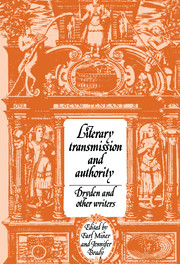Book contents
- Frontmatter
- Contents
- Contributing authors
- Preface
- Acknowledgments
- Introduction: borrowed plumage, varied umbrage
- 1 Dryden and negotiations of literary succession and precession
- 2 Onely victory in him: the imperial Dryden
- 3 Ovid reformed: issues of Ovid, fables, morals, and the second epic in Fables Ancient and Modern
- 4 Another and the same: Johnson's Dryden
- Index
Preface
Published online by Cambridge University Press: 19 January 2010
- Frontmatter
- Contents
- Contributing authors
- Preface
- Acknowledgments
- Introduction: borrowed plumage, varied umbrage
- 1 Dryden and negotiations of literary succession and precession
- 2 Onely victory in him: the imperial Dryden
- 3 Ovid reformed: issues of Ovid, fables, morals, and the second epic in Fables Ancient and Modern
- 4 Another and the same: Johnson's Dryden
- Index
Summary
Of all English authors, Dryden has special claims for attention in a study of literary authority and transmission. He is the first English critic to reflect at length on the acts of his own poetic creation; the first to theorize about translation; the first to posit the existence of literary ages or periods; and the first to seek to arrange poets in an order from those originating a literary culture to his own day. He followed Ben Jonson in giving close attention, not only to poets who were his contemporaries, but also to readers, seeking to inform and shape their responses by prefaces and epistles dedicatory to publications of his works. In his lifetime two momentous, related ideas about literature were emerging: that of literary originality (as also borrowing, plagiarism, seizure of rights held by others) and that of literary property. Without the growth of these ideas, the first English copyright act would not have come into being in 1709.
In trying to account for Dryden as authority and transmitter, we undertake a familiar, but by no means resolved, subject. Its outlines are clear: who does not know of Dryden on his predecessors in An Essay of Dramatick Poesie or of his full Virgil of 1697? But the former has raised new questions for recent readers, and the latter is mostly unstudied in important matters. There have been studies of Dryden and Shakespeare, centering on All for Love, or the remarks about Shakespeare, Jonson, and Beaumont and Fletcher in An Essay of Dramatick Poesie.
- Type
- Chapter
- Information
- Literary Transmission and AuthorityDryden and Other Writers, pp. ix - xiPublisher: Cambridge University PressPrint publication year: 1993

